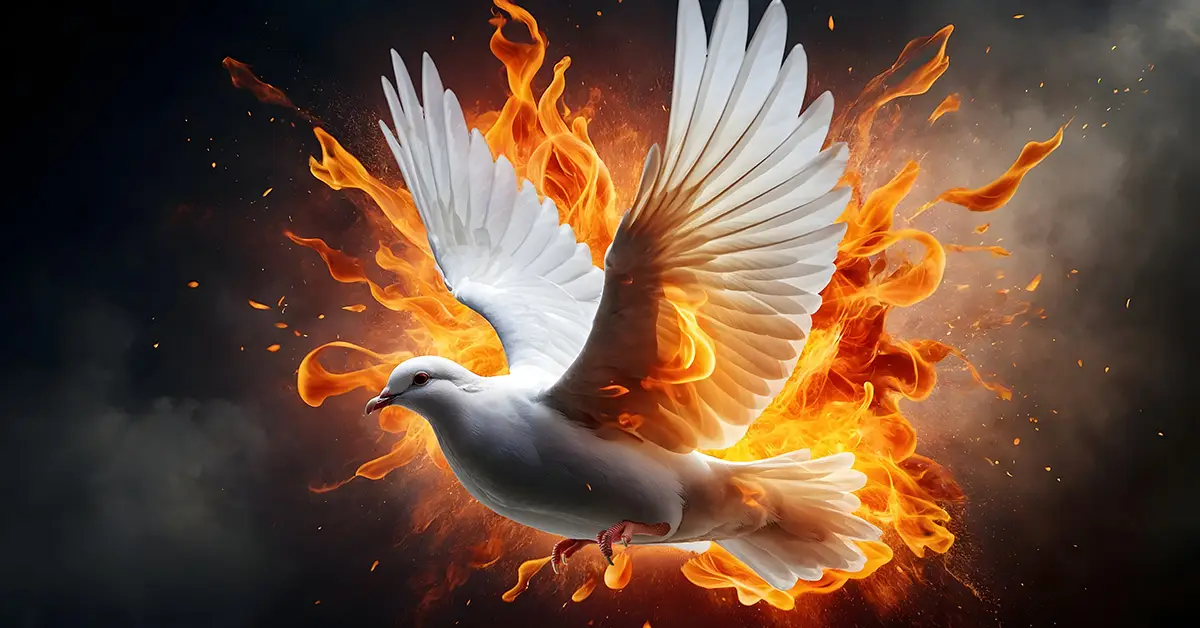What does baptize in Spirit and fire mean?

In Matthew 3:11, John the Baptist declares something profound and mysterious about the coming Messiah:
“I baptize you with water for repentance. But after me comes one who is more powerful than I… He will baptize you with the Holy Spirit and fire.”
, Matthew 3:11 (also in Luke 3:16)
But what does baptize in Spirit and fire mean? For many in Pentecostal circles, this verse has been understood as a promise of spiritual empowerment. The “baptism in the Holy Spirit and fire” is seen as the source of power, gifts, shaking, and even heat sensations that believers often report in revival settings. But what if there’s more to this verse than just an emotional or supernatural experience?
What if the “fire” mentioned here refers not only to Pentecostal manifestations, but also to the Lake of Fire, the ultimate place of judgment and purification?
Let’s explore both interpretations.
1. Pentecostal Fire: Power, Passion, Presence
The most common interpretation among Pentecostals is that this “fire” is spiritual power. That view draws heavily from Acts 2:3:
“Divided tongues as of fire appeared to them and rested on each one of them.”
Many believers describe an electric sensation, bodily shaking, or intense emotional heat during times of deep spiritual encounter, and they attribute this to the “fire of God.” In this view, the baptism of fire is a positive, empowering force, a sign of God’s anointing.
And it’s biblical. The disciples received this fiery empowerment at Pentecost, enabling them to speak in tongues, heal the sick, and boldly proclaim the gospel.
But then comes the next verse in Matthew 3…
2. Fire of Judgment: A Second Baptism?
“His winnowing fork is in his hand… he will burn up the chaff with unquenchable fire.”
, Matthew 3:12
This line immediately follows the baptism in “Spirit and fire.” It introduces an eschatological tone, a picture of Jesus separating wheat from chaff and casting the latter into unquenchable fire.
This causes some scholars and theologians to ask:
Was John referring to two separate baptisms?
- One in the Holy Spirit for believers
- One in fire, representing judgment for the unrepentant
If so, then “fire” is not just about spiritual power, but about purging, separating, and consuming.
3. The Early Church’s View: Fire as Purification
Some early Church Fathers like Origen and Gregory of Nyssa took it one step further. They viewed God’s fire not only as judgment, but as restorative, a purifying presence that refines even the worst sinner over time. To them, the Lake of Fire wasn’t simply punitive, but redemptive.
This aligns with passages like:
“Who among us can dwell with the consuming fire? Who among us can dwell with everlasting burnings?”
, Isaiah 33:14-15
Surprisingly, the answer is the righteous, not the damned. That implies God’s fire is more than punishment; it’s presence. To the righteous, it’s life. To the wicked, it may be unbearable, until it transforms them.
4. One Fire, Two Outcomes
If we pull all of this together, we get a compelling picture:
- God’s Spirit and God’s Fire are not two separate substances.
- They are two manifestations of the same divine presence.
The effect that presence has on a person depends on their spiritual condition:
- To the humble, surrendered believer, His fire is empowerment and refinement.
- To the rebellious or self-righteous, His fire is judgment and exposure.
- But to all, His fire is ultimately purifying, whether now or in the age to come.
In this sense, even the Lake of Fire, dreaded and debated, might be part of this same baptism. A final immersion into God’s holiness that burns away everything false, leaving only what can remain in love.
5. Personal Experience: A Glimpse of Greater Glory?
Many Christians, especially in revival or Pentecostal settings, report real, tangible experiences: warmth in the body, shaking, emotional release, or waves of peace. These are valid and deeply personal encounters. But perhaps they are just a foretaste of something much greater.
What if Pentecostal fire is the spark, and the Lake of Fire is the full blaze?
What if the same presence that empowers you today will one day consume all creation with glory?
That idea fits with 2 Peter 3:10-13, where the entire cosmos is set ablaze, not to be destroyed forever, but to be renewed in righteousness.
Conclusion: Baptized in Spirit and Fire
So was John talking about spiritual power… or eschatological purification?
Yes.
He was talking about both. Jesus came to immerse humanity in the fullness of God’s presence, and that presence is both wind and fire, both Spirit and judgment, both gift and glory.
Whether you tremble under the Spirit in a prayer meeting or stand before the fiery throne at the end of the age, it’s the same presence.
The only question is:
Will it empower you now, or purify you later?
Will you embrace the flame as a friend, or resist it until it becomes a furnace?
Either way…
“Our God is a consuming fire.” (Hebrews 12:29)
And one way or another, He will baptize all in Spirit and fire.
- 08/25/2025
- WRITE A COMMENT
Recent Posts
- The Eternal False Translation: How Aionios Was Corrupted Into Eternal
- The Rich Man and Lazarus
- Does Grace Last Forever?
- His Love Never Fails
- Love and Forgive Your Enemies
- His Mercy Endures Forever
- Scriptures That Teach Universal Reconciliation
- The Lesson of James, Peter and John
- Progressive Salvation is Biblical!
- The Gates Never Shut!


